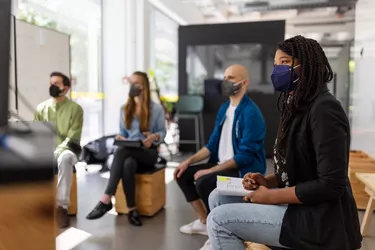
The COVID-19 pandemic has turned the world on its head since late 2019 and early 2020. As of this writing in June 2022, COVID-19 cases are still surging in many parts of the world, as new variants continue to take hold. By now, you may or may not be working remotely or back to the office. While there may be a part of you that's looking forward to getting back to the office, it can be extremely intimidating due to the very real threat that COVID-19 poses. There's a name for what you might be feeling, according to the Cleveland Clinic. It's "re-entry anxiety."
The New Normal
Video of the Day
COVID-19 can still make you very ill, and you also have the capacity to spread it to others, even if you do not get noticeably sick yourself. When you return to the office, the CDC cautions you to keep a few things in mind:
Video of the Day
- Your coworkers and anyone visiting your office might still have the virus but not know it because they're asymptomatic.
- The longer you interact with these people, the more you're at risk if you haven't been vaccinated.
- Nobody should be swapping staplers, files or phones without sanitizing afterward, just like in 2020.
- That said, COVID-19 is largely spread through airborne transmission, so wearing a high-quality N-95 mask whenever possible is truly the best way, coupled with vaccinating and boosting yourself, to stay safe in public.
- You may have no way of knowing for sure who has been vaccinated or what precautions they are taking at home.
And you can probably expect that not everyone is going to be overjoyed to be back at work. Massachusetts General Hospital cautions that you should expect some mixed reactions from your coworkers, and some symptoms of stress might not become apparent for a while.
Employers’ Role and Responsibilities
Of course, your employer has a decisive role in all this. Ideally, they've made some changes in the office to keep you safe even as the threat of COVID ticks down, such as by installing some sort of barriers between workstations.
They might even bring you all back in staggered shifts so reacquainting with your work life isn't a total shock to your system. You might want to ask about that if it hasn't been suggested, and if you feel comfortable doing so.
Masking in the office, air filtration systems and social distancing still work and are still very important. The more you can do to slow the spread, the better off you and your colleagues will be.
Can You Drop the Mask?
The CDC advises that you shouldn't assume the coast is clear. Keep a high-quality N-95 mask with you at all times, and put it in whenever you are working indoors if at all possible. Working in an office doesn't mean you won't be exposed to clients coming in and out, even if you're not dealing with retail customers. Continue to remain six feet apart from people you don't know and put that mask on for these occasions.
You should also consider masking inside no matter what, as COVID-19 is airborne and prolonged periods of sharing indoor air (particularly if it is not properly filtered) puts you at a high risk for infection.
Establish your personal space, and allow yourself the luxury of decreasing your barriers gradually. You don't have to jump full-in to social interaction again with both feet. If someone asks you to put a mask on, do it. Everyone will have their own comfort levels.
Can Your Employer Make You Get Vaccinated?
What your employer can and cannot do is a somewhat complicated issue these days. All the old pre-COVID employment laws are still in effect, and now they're overshadowed by a lot of coronavirus legislation.
Your employer can ask whether you've been vaccinated. What they can't do is ask if you have any kind of health condition that could be exacerbated by the virus. That crosses over the line of disability laws.
And yes, as of June 2022, your employer can require that you be vaccinated before returning to work, according to the U.S. Equal Employment Opportunity Commission. But Title VII of the Americans with Disabilities Act requires that they make "reasonable accommodations" if you refuse due to a religious "belief, practice or observance." The same goes for requirements to return. Your best bet in this kind of situation might be to speak with an employment lawyer if you run into problems.
Ease Your Way Back In
There are a few things you can do if you're feeling a bit unnerved at the prospect of going back. The Cleveland Clinic suggests going back before you have to if possible, if only for a brief visit.
Reacquaint yourself with your workspace, and check out any measures your employer has implemented to keep workers safe. Sit in your chair. Spritz off your desk. Put on your N-95 and breathe. If you are truly at great risk of COVID-19 complications, talk to your Human Resources department and see if they can make accommodations for you.
- Centers for Disease Control and Prevention: Returning to Work
- Society for Human Resource Management: COVID-19 Back-to-Work Checklist
- Massachusetts General Hospital: Post-Pandemic Anxiety – Feeling Stressed As Things Return to Normal
- U.S. Equal Employment Opportunity Commission: What You Should Know About COVID-19 and the ADA, the Rehabilitation Act, and Other EEO Laws
- Cleveland Clinic: Returning to Work Soon? Here Are Some Ways to Make the Process Easier